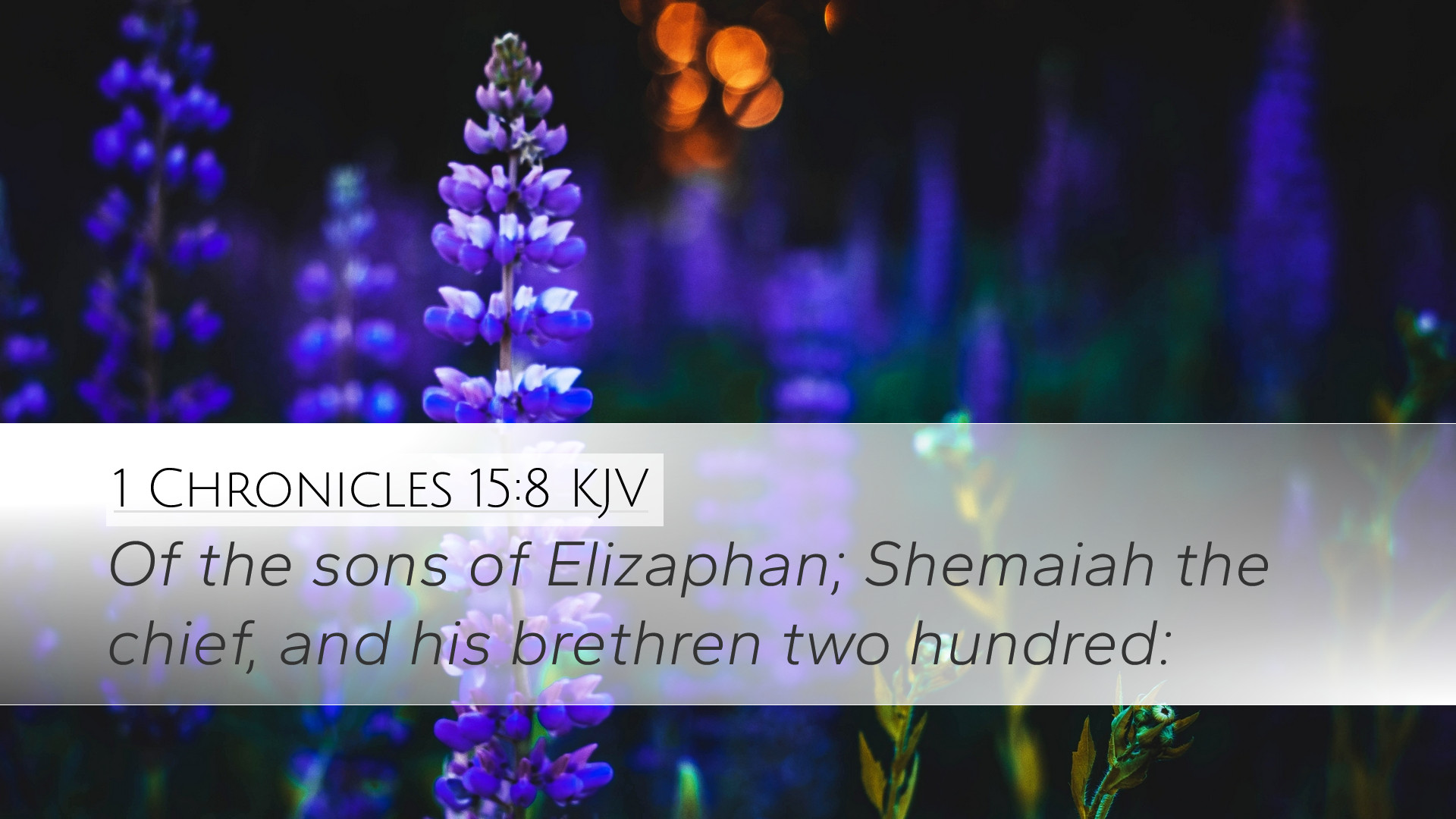Commentary on 1 Chronicles 15:8
Verse: "Of the sons of the Levites; the sons of Kohath; Uriel the chief, and his brethren an hundred and twenty."
Introduction
This verse situates itself within the broader narrative of David's preparations to bring the Ark of the Covenant to Jerusalem. It highlights the critical role of the Levites, particularly the sons of Kohath, in the sacred rites associated with worship and the transport of the Ark. Understanding this verse requires exploration of its theological implications, historical context, and liturgical significance.
Theological Insights
- The Role of the Levites: The Levites were set apart for specific duties pertaining to the worship of God. The mention of the sons of Kohath indicates a designated line responsible for bearing the most holy items, including the Ark of the Covenant.
- Leadership and Order: Uriel, being the chief of the Kohathites, signifies the importance of leadership in divine service. His station above the other Levites reminds us of God’s structured approach to worship, reflecting that there is an order in His house that must be followed.
- Significance of Numbers: The mention of “an hundred and twenty” indicates the fully equipped and numerous nature of the Levites present. It emphasizes the gravity and seriousness with which God’s commands regarding worship should be treated.
Historical Context
This verse occurs within the historical framework of David’s reign over Israel. After the initial failure to transport the Ark inappropriately (as narrated in 2 Samuel 6), David’s actions here represent a return to the Lord’s instructions laid down in the Law of Moses regarding the handling of holy objects.
Key Historical Reflections:
- Levitical Service: The Levitical families had established roles, as outlined in Numbers 4; Kohath was entrusted with the care of the most sacred items. This reinforces the idea of divine selectiveness and the honor bestowed upon specific families to serve God directly.
- David's Intent: King David’s push to restore proper worship indicates a transformative period for Israel, emphasizing the importance of understanding the past and rectifying it in alignment with divine expectations.
Liturgical Significance
In the worship context, the organization of the Levites sets a precedent for modern worship practices. The careful attention to detail in whom God chose to serve and how their service is organized speaks to the broader Christian principle of offering one’s best to God. David’s meticulous planning for the Ark’s transport establishes a model for the structure, reverence, and orderliness that should characterize corporate worship.
Reflections for Today's Worship:
- Preparation for Worship: Just as David prepared himself and the Levites, contemporary worship requires equal preparation, whether spiritually or organizationally, to ensure that worship is not conducted lightly.
- Importance of Priesthood: The priestly ministry of the New Testament informs church leaders today that serving God in worship is a high calling and must be respected as such.
- Community Involvement: The fact that Uriel’s group included such a large number illustrates the communal aspect of worship, reminding us of our collective responsibility in honoring God.
Commentary Excerpts
Matthew Henry elaborates on the call of Kohath’s descendants, noting that “they were not merely attendants but were privileged to engage in the most sacred duties, establishing the weight of their service.” He emphasizes that “the chief stands in the gaze of the congregation as their leader, exemplifying sincerity in worship.”
Albert Barnes notes, “The organizing principle of the Levites in service reveals how serious worship is, and it serves as an example of how order reflects God’s nature.” He reinforces the idea that diligent service leads others toward God’s presence.
Adam Clarke points to Uriel’s significance as a chief among the hundred and twenty, implying that “spiritual leaders are often outnumbered, yet their influence in conducting the people reverently before God cannot be understated.” Clarke highlights the seriousness with which one should approach any ministry associated with God’s worship.
Conclusion
1 Chronicles 15:8 encapsulates a critical moment in Israel's worship history, underscoring the significance of divine order in ministry and the concept of holy service. It reminds pastors, theologians, and students alike that a respectful and prepared heart towards God’s service is paramount in drawing near to Him and fulfilling His will.


